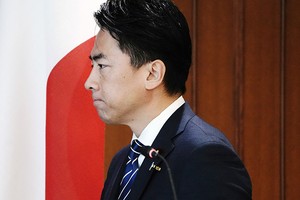THE ASSOCIATED PRESS
April 20, 2021 at 12:30 JST
 Hea Kyung Kim, an 81-year-old South Korean immigrant, pauses for photos in her apartment in the Koreatown neighborhood of Los Angeles on March 24. (AP Photo)
Hea Kyung Kim, an 81-year-old South Korean immigrant, pauses for photos in her apartment in the Koreatown neighborhood of Los Angeles on March 24. (AP Photo)
LOS ANGELES--Yong Sin Kim, an 85-year-old Korean immigrant living in a senior apartment complex in downtown Los Angeles, says he rarely leaves home these days. When he does, he carries a whistle with him; at least he could call for help if he’s attacked.
Three floors up in the same building, Hyang Ran Kim, 74, waits for her daughter to pick her up. She is temporarily moving into her daughter’s place in a quieter neighborhood in the suburbs. Kim says her daughter is worried about her safety.
Amid a surge of anti-Asian violence, fear creeps in and alters the daily life of vulnerable Asian seniors.
Asian Americans have been targets of discrimination, threats and violence that have escalated in the past year because the coronavirus pandemic originated in Wuhan, China. Some have blamed former President Donald Trump for fanning flames of intolerance by calling COVID-19 the “China virus” and “kung flu.”
People of Asian descent have been spit on, beaten and told to go back to where they came from. Reports of violence have been on the rise, most notably when a white gunman killed eight people--six of them Asian women--in a string of shootings at Atlanta area spas in mid-March. Four of the women were of Korean descent.
While police haven’t said that was a hate crime, overt examples of racism have surfaced, such as a surveillance video showing a man in New York City kicking an Asian American woman and stomping on her face while shouting anti-Asian slurs.
In LA’s Koreatown, Denny Kim, a U.S. Air Force veteran said he was beaten in February by two men who shouted slurs such as “ching chong” and “China virus.” Police were investigating it as a hate crime.
Discrimination against Asian groups has a long and ugly history dating back to California’s origins--from Chinese laborers exploited during construction of the transcontinental railroad to the large number of Japanese immigrants and their American-born children herded into internment camps during World War II.
Korean Americans in Los Angeles found themselves under siege three decades ago during the 1992 riots that broke out following the acquittal of the police officers who beat Black motorist Rodney King. Anger over the verdict merged with tensions that had been brewing in the Black community over Korean ownership of mom-and-pop shops in their neighborhoods.
Arsons and looting spread from South Los Angeles into Koreatown, where merchants guarded their shops with guns. Despite the defense, much of the $1 billion in the city’s economic losses from the riots were in Koreatown.
For Yong Sin Kim and his wife, who were quarantined in their small apartment for days after they tested positive for COVID-19, their confinement continues to avoid another virus--violence.
“We don’t go out at all. We stay home all day as if we are locked up,” said Kim. “I can’t even think of going for a walk.”
For 74-year-old Sung Hee Chae in Koreatown, it’s about a 6-minute walk to the nearest Korean grocery market. Chae said she doesn’t go there alone anymore. Her son accompanies her to the market these days. Her daughter in South Korea urges her not to go out at all.
“I was terrified,” said Chae about the recent shooting in Atlanta. “It was horrifying.”
The bloodshed led to an outpouring of support for Asian Americans and rallies condemning hatred against any group.
“I wish all of us could get along fine regardless of the color of skin. I feel sad. I have mistreated no one,” Chae said.
Jen Ho Lee, 76, has a faint heart. She is weak. She needs her walker to get around. She also limits her outings for the same reason as other Korean seniors.
But, the series of recent attacks against Asian people brought a different change for Lee.
Lee took a trip to Koreatown to attend a recent protest against anti-Asian hate crimes. It took her two buses to get there and two buses back to her home.
With signs that say “Stop Asian hate,” and “I’m not a virus” taped around her walker, she chanted slogans.
“We should be united. We Asians can’t stay silent,” said Lee. “I didn’t go to the rally because I had plenty of time or because I was healthy.”
“It is wrong to think these attacks have nothing to do with me. This could happen to me or my family one day,” Lee added.




















A peek through the music industry’s curtain at the producers who harnessed social media to help their idols go global.
A series based on diplomatic documents declassified by Japan’s Foreign Ministry
Here is a collection of first-hand accounts by “hibakusha” atomic bomb survivors.
Cooking experts, chefs and others involved in the field of food introduce their special recipes intertwined with their paths in life.
A series about Japanese-Americans and their memories of World War II